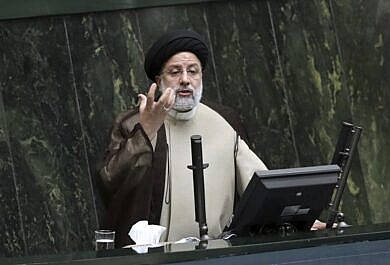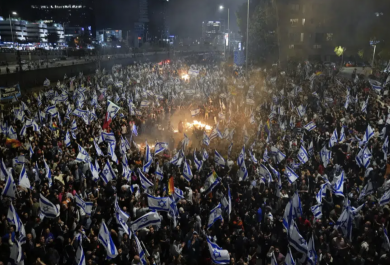Shipping lanes in the Red Sea – the premier East-West trade route between the Mediterranean Sea and the Indian Ocean – have been disrupted by attacks by the Iranian-backed Houthi militia. The Biden administration announced a new task force on Tuesday after weeks of inaction.
Summary
Shipping lanes in the Red Sea – the premier East-West trade route between the Mediterranean Sea and the Indian Ocean – have been disrupted by attacks by the Iranian-backed Houthi militia. The Biden administration announced a new task force on Tuesday after weeks of inaction.
- The Houthis, a militia group that effectively rules northern Yemen, have launched a series of attacks on US naval assets and international shipping in the Red Sea with missiles and drones. About 12% of global shipping passes through the Red Sea and the Suez Canal, a key linchpin of the trade networks between Europe, Africa, and Asia.
- The Houthi attacks – and the lack of a strong US response before today – have forced container ships transiting the Red Sea to shut off their tracking systems and adjust their routes to avoid becoming a target of the Houthis.
- Shipping conglomerate Maersk, BP, and Mediterranean Shipping Company all announced they would reroute their vessels to avoid attacks from the Houthis. The rerouting could lead to a jump in prices for oil and the other $1 trillion worth of trade goods that pass through the Red Sea.
- On Tuesday, Defense Secretary Lloyd Austin announced a new US-led task force would protect commercial vessels passing through the Red Sea from Houthi attacks. The multinational security mission is code-named “Operation Prosperity Guardian.”
- The task force will include five members of the G7 – the US, the United Kingdom, Canada, France, and Italy – along with the Netherlands, Spain, Seychelles, Norway, and one Arab country: Bahrain. It’s not clear how many ships will patrol the crucial shipping lane, where at any given time about 1,000 commercial vessels are in transit.
- Austin’s announcement is a sharp reversal from the administration’s prior stance. According to Politico, less than two weeks ago the administration believed “striking Houthis in Yemen is the wrong course of action.” The Pentagon even reportedly refused to brief Biden about options for a strike on the Houthis.
- The Biden administration stuck with this belief despite at least 94 separate drone and rocket attacks on US forces in the region since Oct. 7. At least 66 service members have been injured in the attacks, including at least 19 who sustained traumatic brain injuries.
![]()
- CNN contextualized that the Houthi movement emerged in the 1990s as a religious revival party, but eventually armed themselves and took advantage of the chaos caused by the Arab Spring to fight a brutal civil war against Yemen’s government and now control most of the country’s north.
- “Iran has cultivated the Houthis for years, mirroring its efforts over the last three decades to build up other militias, including Hamas in Gaza and Hezbollah in Lebanon, and extend its reach across the Middle East,” the New York Times reported. “Seeking new ways to menace Saudi Arabia, its longtime rival, Iran integrated the Houthis into its network of militias, delivering military aid that helped transform the group during Yemen’s civil war, according to American and Middle Eastern officials and analysts. The Houthis’ arsenal now includes long-range drones, cruise missiles and ballistic missiles.”
- Houthi ruling council member Mohammed Albukhaiti told the Washington Post, “Our war is a moral war, and therefore, no matter how many alliances America mobilizes, our military operations will not stop.” The militant leader added, ““Participating in a coalition to protect the perpetrators of genocidal crimes is a disgrace in the history of the participating countries.”
![]()
- The New York Post reported the IDF discovered more than $1.3 million in cash inside a pair of suitcases inside the home of a “senior Hamas terrorist.” The IDF suggested the funds were pilfered from aid meant for Palestinian civilians. The Post noted “Hamas has long been accused of stealing money donated to Palestinian aid to fund their military wing and to allow its leadership to enjoy lavish lifestyles abroad while civilians struggle.”
- In another blow to Hamas’ budget, the IDF eliminated Subhi Ferwana, a top Hamas financier, with an Israeli Air Force fighter jet. According to Fox News, Ferwana was “involved in the transfer of tens of millions of dollars to the Hamas terrorist organization and its military wing in the Gaza Strip through their money exchange company, ‘Hamsat.’”
- National Review’s Noah Rothman argued the US “must restore deterrence in the Red Sea.” “Iran and its proxy forces have paid almost no price for their attacks on the U.S. and the international order America maintains. They are undeterred,” Rothman wrote. “This is an unacceptable threat to the U.S.-led international order — one to which the Biden administration closed its eyes in the hopes that it would go away on its own. In early December, Politico revealed that senior officials within the Pentagon had withheld from the president and his senior appointed officials options for retaliating against the Houthis in their fear that Joe Biden may implement one of them.”
© Dominic Moore, 2023






